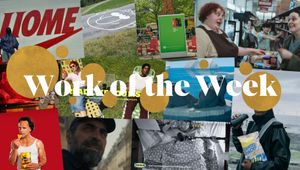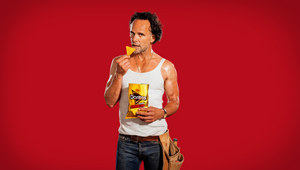
Finely Sliced: The Life Long Journey of Practicing with Tobias Suhm

Meet Tobias Suhm, senior editor and partner at The Den, who has taken the industry by storm with his brilliant editing skills. Tobias has worked with some of the most renowned international brands, earning industry accolades from prestigious awards shows such as Cannes, CLIO, and the Webbys.
Tobias' creative partnership with the DGA-nominated director, Ian Pons Jewell, has given birth to some of the most talked-about work in the industry for the past several years. Their dynamic duo has created captivating commercials, documentaries, and music videos that have made a huge impact.
Tobias hails from the picturesque Black Forest region in the southwest corner of Germany, where his childhood was filled with 80s movies, including every Spielberg classic. His early fascination with films led him to attend the world-renowned Filmakademie Baden-Württemberg, which Hollywood Reporter cited as one of the Top 10 Film Schools in the World.
LBB> The first cut is the deepest: how do you like to start an editing project?
Tobias> By not being given too much information upfront, that way the footage can speak more freely for itself. It’s also a lot more fun to let the footage guide your journey. Simply cutting down the storyboards can give the whole project a bit of a painting by numbers vibe.
LBB> Non-editors often think of editing just in technical terms but it’s integral to the emotion and mood of a film. How did you develop that side of your craft?
Tobias> I think a lot of the emotional aspects of film editing involves just regular common sense. It’s the so called gut feeling that is inherent in everybody. The further along you are in your career as an editor, the better you can understand your own gut feeling until it seamlessly crosses over into your daily work routine. It’s simply a lot of learning by doing. I guess you could probably compare it to learning a martial art. It doesn’t just end with obtaining a black belt, it’s a life long journey of practicing.
LBB> How important is an understanding of story and the mechanics of story?
Tobias> Robert Breson once said that a film is being written three times, first when writing the script, a second time during the shooting and finally in the editing. According to this logic that makes an editor also a writer of sorts or a story teller, and I think that’s the whole point of editing. If you don't have an understanding for story then maybe this isn’t the right profession for you. I think this is also valid for projects that don't fall into the traditional storytelling category. At the end of the day, a film project is always about telling a story whether it is being executed as a traditional three act structure or as an abstract art film.
LBB> Rhythm and a sense of musicality seem to be intrinsic to good editing (even when it’s a film without actual music) – how do you think about the rhythm side of editing, how do you feel out the beats of a scene or a spot? And do you like to cut to music?
Tobias> This is another one that falls into the gut feeling category. A good example for this is when I made a little six minute short film with my then eight year old daughter during the lockdown (she was in charge of writing and directing). When it came time to show her my first assembly, she was instantly able to tell me which moments she thought felt too short or too long without overthinking it. But I also think that having learned to play an instrument in my childhood may have had a beneficial impact on my general understanding for rhythm. Although relying too much on music can be a bit like cheating, because when you add music to something, everything seems to flow alright that's why I like to turn the music off every now and then and reassure myself that the flow of a scene is right even though there is no music to glue it all together. I find it a lot more interesting to create rhythm by incorporating sound effects early on. I usually use temp music only as a guide for the overall pacing of a scene/project and cutting to the beat and cues of a music track can feel pretty corny, unless what you are working on is something that was specifically designed and choreographed to a predetermined music track of course.
LBB> Tell us about a recent editing project that involved some interesting creative challenges.
Tobias> I can't really think of a particular project, because somehow I feel like every project faces the same challenges in a way. It’s pretty much always about finding the right flow, no matter how big or post heavy a project is and everything else are just minor technicalities.
LBB> How important is your relationship with the director and how do you approach difficult conversations when there is a creative difference of opinion?
Tobias> The relationship with a director is for sure the most important one that you can have as an editor. Filmmaking is a team effort and great directors tend to surround themselves with a crew of frequent collaborators to ensure a certain standard of quality. It’s like a well oiled machine that directors can rely on, which is supposed to free their minds up to fully focus on their creativity and vision. The better you know each other, the easier it becomes to solve problems together, and in case you have varying opinions about something specific, I find it always helpful to explore different options and then look at them side by side and make a case why one version works better than the other. Overall I think creative difference of opinions occur a lot more often when working with clients rather than working with your director.
LBB> In the US we know that editors are much more heavily involved across the post production process than in Europe - what’s your favourite part of that side of the job?
Tobias> The more responsibility you are given of guiding your clients through the pitfalls of post production enables you to become less of an operator and more of a creative head of department. It also builds confidence in what you do.
LBB> What’s harder to cut around – too much material or not enough? (And why?)
Tobias> By definition I would say 'not enough' means something is missing. In that case I would say you can never have too much material, because if something is missing then it is simply not existing and that might make it a lot harder for an editor to then come up with viable solutions for problems that might occur along the way.
LBB> Which commercial projects are you proudest of and why?
Tobias> You gotta love 'em all equally but generally speaking I prefer the darker and weirder projects I have been working on.
LBB> There are so many different platforms for film content now, and even in advertising something can last anything from a few seconds to a couple of hours. As an editor, are you seeing a change in the kind of projects you’re getting from brands and agencies?
Tobias> Not really.
LBB> Who are your editing heroes and why? What films or spots epitomise good editing for you?
Tobias> I think editing is particularly great when it doesn't get in the way of the story. It should always take a backseat when it comes to the overall story telling of a film, otherwise it can take you out of the experience. Think of style over content. I believe the more you think about how a film is edited, the less you pay attention to the story, the less of a good of job they did with the editing work. Editing is considered an invisible art form, which means the less you consciously see it, the better it is. I’m not saying you should not be allowed to go 'over the top' in editing at all, as long as it supports the overall story telling of the film you can do whatever you want and break all the rules you want, that’s why it’s called art. Hank Corwin for example demonstrated this 'over the top' approach masterfully in the movie Natural Born Killers.
LBB> How does editing in the commercial world differ from the film world and TV world?
Tobias> I’m not totally sure if it differs that much, technically speaking at least. Sometimes commercials can feel like tiny movies and big blockbuster studio movies can feel like two hour long commercial spots if you look at all the product placement. I imagine the steps you need to take to get across the finishing line are somewhat similar for the most part in all the disciplines. I did dabble in longer formats in the past and I would say the biggest difference to me were the turnaround times and the fact that there are usually fewer opinions involved when working on longer formats than there can be in the commercial world, but that's just my experience.
LBB> Have you noticed any trends or changes in commercial editing over recent years?
Tobias> Trends come and go and often times what's trendy today, can feel outdated a year later already. The classic masterpieces that have stood the test of time are usually less on the trendy side but adhere far more often to the principles of traditional storytelling than not, so for that reason I try not to jump inconsiderately on every trend’s bandwagon.















